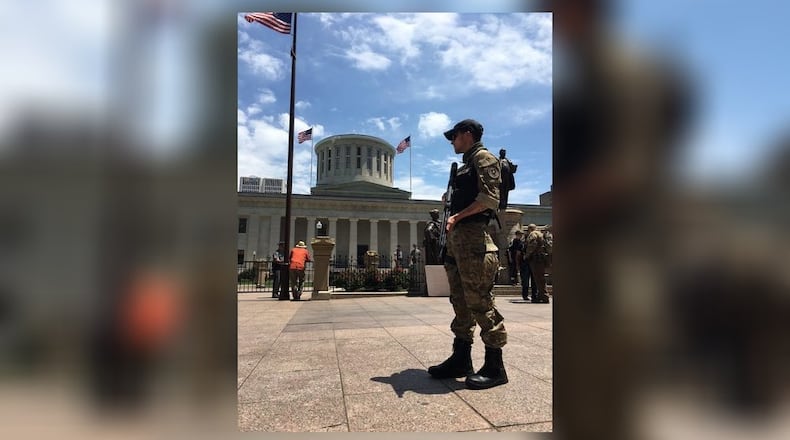“They just don’t get it, do they?” said former state lawmaker Tom Roberts, president of the Ohio NAACP, which opposes the bill.
Business owner on controversial comment: “I have wounded the community”
Ohio House Minority Leader Emilia Sykes, D-Akron, said in a written statement: “By putting the so-called Stand Your Ground or Kill at Will bill on the agenda during a week of chaos and racial unrest, Republican leadership is showing Ohio what their true values and priorities actually are. The decision to hear this bill also tells the thousands of Ohioans who have flooded the streets in towns and cities all over the state that their voices do not matter.”
House Bill 381, co-sponsored by state Rep. Candice Keller, R-Middletown, received a hearing Tuesday afternoon. House Speaker Larry Householder, R-Glenford, who has the power to block or move any bill, said no decision has been made yet on whether the legislation will get a floor vote this week. He didn’t respond to requests for comment from the Dayton Daily News about Sykes’ criticism.
SHARE YOUR THOUGHTS: ‘Courageous Conversation’ on black community, police relations in Dayton set
Last week, Householder delayed action on another gun bill, HB425, in deference to the George Floyd memorial that was underway. That bill would eliminate the penalty if concealed carry weapons permit holders stopped by police fail to tell the officer that they’re carrying a weapon.
The “Stand Your Ground” bill is more controversial.
Under current law, citizens have a duty to retreat from danger in public before using deadly force in self-defense. The bill seeks to remove that duty. Laws in at least 25 states allow that there is no duty to retreat from an attacker in any place where someone has a lawful right to be, according to the National Conference of State Legislatures.
DETAILS: Records: Springboro grad exposed to tear gas, pepper spray at protest 2 days before her death
Doug Deeken of Ohioans for Concealed Carry testified in favor of Keller’s bill, saying that requiring people to try to retreat from danger puts them at a disadvantage.
“It does not consider the reality that most self-defense encounters take place very quickly and that forcing the victim of a crime to first attempt to retreat can put them at a very serious disadvantage to surviving the violent encounter,” Deeken said in written testimony.
Dean Rieck of Buckeye Firearms Association said removing the duty to retreat would not give someone greater latitude to use lethal force. “The only time you can legally use lethal force is when you honestly believe you are in imminent and unavoidable danger of death or great bodily harm,” he said.
Stand Your Ground laws have been in the spotlight since the 2012 shooting death of Trayvon Martin in Florida. Again this year, the shooting death of Ahmaud Arbery in Georgia has sparked debate over such laws. Research from RAND Corp. found that stand your ground laws may increase homicide rates.
RELATED: A look at major changes to Ohio gun laws over the years
In 2008, then-Gov. Ted Strickland, a Democrat, signed Ohio’s castle doctrine into law, allowing individuals to use reasonable force, including deadly force, to protect themselves against intruders in their homes or occupied vehicles.
About the Author

